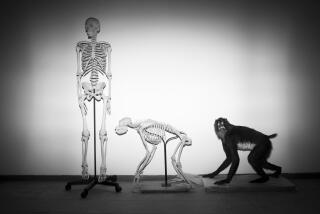Dinosaurs were wired for flight, thanks to bigger brains
- Share via
Dinosaurs may have taken flight earlier than we thought -- thanks to a larger brain.
A new study in Nature finds that a wider range of dinosaurs may have had the neurological capacity to fly -- not just Archaeopteryx, the feathered dinosaur that’s considered the direct ancestor of birds.
While it’s well-established that birds are modern-day dinosaurs, how they evolved from fearsome, meat-ripping theropods to dainty doves remains a hot topic of research.
When Amy Balanoff, a paleontologist at Stony Brook University in New York, began planning a study of the evolution of dinosaur brains along their family tree, she expected to see a steady increase in size, following the observation that modern birds have larger brains than their ancestors.
But to test her theory she needed some dinosaur brains.
Fossil skulls were plentiful, but how to reconstruct what was once inside?
“We used CT technology to digitally fill in skulls,” she said.
When the brain fills most of the skull, it “actually leaves an impression on the surrounding bone,” Balanoff said. That makes it possible to create a virtual “cast of what the brain would have looked like.”
So Balanoff and her colleagues took CT scans of the skulls of dinosaurs and modern birds. Then they used software to construct 3-D digital brains and measured the volume, which was compared to the animals’ overall body sizes (inferred from thigh bones).
Balanoff was able to include both the Archaeopteryx brain and the brains of close relatives, such as the deinonychosaurs, in the analysis -- a first for paleontology. By examining a more thorough set of bird ancestors, she hoped to better understand the transformation of the brain as birds emerged.
When she put all the data together, she found an overall increase in brain size as the creatures became less like traditional dinosaurs and more like modern birds. But she was surprised to find that larger brains, just like feathers, weren’t unique to modern birds -- some of their ancestors had them too. For instance, Archaeopteryx had a smaller brain than some of birds’ more distant dino-cousins, such as the four-winged deinonychosaurs.
Balanoff says this probably means that several bird ancestors were equipped for some kind of basic flight, even if that meant just gliding from tree to tree.
“These large brains meant they probably had the neurological capacity to navigate in complex environments,” she said.
But there is still some debate over how much we can infer from the trend in brain size. Kevin Padian, a paleontologist at UC Berkeley, says that the dinosaurs before Archaeopteryx lacked the anatomy to fly. Plus, “their wings were too small, and there’s no convincing evidence that they glided -- although controlled falling can’t be ruled out,” he said.
Padian also made the point that “brain size isn’t everything.”
“I have a big brain and I can’t fly,” he said. “Many animals with really tiny brains, such as ants, are capable of complex behavior.”
Follow on Twitter: @BradBalukjian





